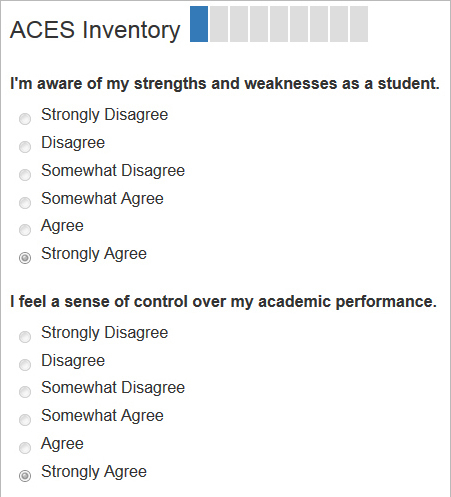Using ACES in Your Course
The Academic and Career Excellence System (ACES) is an instrument developed to measure student strengths in twelve critical areas, both cognitive and noncognitive. Created by counseling psychologists Paul Gore, Wade Leuwerke, and A.J. Metz, who have more than thirty years’ combined experience in college success and assessment, the ACES instrument prompts students to reflect on their habits, behaviors, attitudes, and skills. Norm-
What is ACES?
ACES is a developmental instrument: It provides you and your students a snapshot of their strengths and suggests next steps. Use ACES to start conversations with students individually and as a class about how to achieve excellence in college and in their careers.
At the administrative and institutional levels, use aggregate information about student performance from ACES to track progress within your program and individual classes and to determine the type and level of resources needed to help students succeed. Trends in your student body’s strengths and weaknesses can be opportunities for intervention or resource allocation.
ACES Scales
ACES asks students about the following areas, or scales:
- Critical Thinking and Goal Setting
- Motivation, Decision Making, and Personal Responsibility
- Learning Preferences
- Organization and Time Management
- Reading
- Note Taking
- Memory and Studying
- Test Taking
- Information Literacy and Communication
- Connecting with Others (Interpersonal Skills, Emotional Intelligence, and Diversity)
- Personal and Financial Health
- Academic and Career Planning
These scales represent noncognitive, psychosocial areas (such as motivation and goal setting) and cognitive areas (such as reading and memory) that contribute to both academic and career success.
Each scale is addressed by 5 or more personal statements, which have been empirically supported using a national sample. Students rate how strongly they agree with statements such as “I feel a sense of control over my academic performance” or “My notes are legible and well organized.”
Students’ levels of agreement are compared to national norms. The norms are updated yearly.
